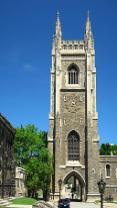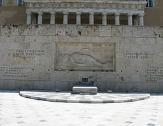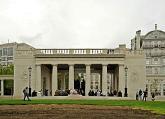II.43: Reception & Key Issues
How the Passage Has Been Received
[1] Such was the end of these men; they were worthy of Athens, and the living need not desire to have a more heroic spirit, although they may pray for a less fatal issue. The value of such a spirit is not to be expressed in words. Any one can discourse to you for ever about the advantages of a brave defence, which you know already. But instead of listening to him I would have you day by day fix your eyes upon the greatness of Athens, until you become filled with the love of her; and when you are impressed by the spectacle of her glory, reflect that this empire has been acquired by men who knew their duty and had the courage to do it, who in the hour of conflict had the fear of dishonour always present to them, and who, if ever they failed in an enterprise, would not allow their virtues to be lost to their country, but freely gave their lives to her as the fairest offering which they could present at her feast.
[2] The sacrifice which they collectively made was individually repaid to them; for they received again each one for himself a praise which grows not old, and the noblest of all sepulchers—I speak not of that in which their remains are laid, but of that in which their glory survives, and is proclaimed always and on every fitting occasion both in word and deed.
[3] For the whole earth is the sepulchre of famous men; not only are they commemorated by columns and inscriptions in their own country, but in foreign lands there dwells also an unwritten memorial of them, graven not on stone but in the hearts of men.
[4] Make them your examples, and, esteeming courage to be freedom and freedom to be happiness, do not weigh too nicely the perils of war.
[5] The unfortunate who has no hope of a change for the better has less reason to throw away his life than the prosperous who, if he survive, is always liable to a change for the worse, and to whom any accidental fall makes the most serious difference.
[6] To a man of spirit, cowardice and disaster coming together are far more bitter than death striking him unperceived at a time when he is full of courage and animated by the general hope.
Reception of the Passage
War Memorials Some of the many examples from across the world that use quotes from this passage of Thucydides:

Soldiers' Tower at the University of Toronto, a bell and clock tower completed in 1924. The Memorial Screen inside includes this passage: "To the glorious memory of members of this university who fell in the Great War 1914-1918. Take these men for your ensamples. Like them remember that prosperity can be only for the free, that freedom is the sure possession of those alone who have the courage to defend it." This unusual version of the quotation first appears in a law article by J.Murray Clark, a Toronto lawyer who was an alumnus of the university; from here, it seems to have spread around the world. Above one of the arches, commemorating the dead of WWII, is inscribed: "Their story is not graven only on stone over their native earth, but lives on far away, without visible symbol, woven into the stuff of other men's lives", a translation by the British historian and scholar of international relations Alfred Eckhard Zimmern.

The Auckland War Memorial Museum (often known just as the Auckland Museum), completed in 1929: "The whole earth is the sepulchre of famous men..." This passage is found on many war memorials in New Zealand, and others in Australia and Canada, and is often used as part of the commemoration of ANZAC Day: see www.anzacday.org.au/education/tff/rememwords.html
 The Tomb of the Unknown Solider in Syntagma Square, Athens. There are two quotations in Greek from Thucydides; on the left, "They also carry a single empty litter decked with a pall for all whose bodies are missing" (II.34) and on the right, "The whole earth is the tomb of famous men."
The Tomb of the Unknown Solider in Syntagma Square, Athens. There are two quotations in Greek from Thucydides; on the left, "They also carry a single empty litter decked with a pall for all whose bodies are missing" (II.34) and on the right, "The whole earth is the tomb of famous men."
 The new Bomber Command Memorial in Green Park, London; one of the inscriptions inside reads "Freedom is the sure possession of those alone who have the courage to defend it." The monument has been very controversial, and this includes the quote from Pericles; "Its tone is defiant and triumphant, using quotations from Churchill and Pericles to justify the bombings..." (Rowan Moore in The Observer, 24/06/12: link). The following comments on its classicism are focused on the architecture, but could they also apply to the use of classical quotes?
The new Bomber Command Memorial in Green Park, London; one of the inscriptions inside reads "Freedom is the sure possession of those alone who have the courage to defend it." The monument has been very controversial, and this includes the quote from Pericles; "Its tone is defiant and triumphant, using quotations from Churchill and Pericles to justify the bombings..." (Rowan Moore in The Observer, 24/06/12: link). The following comments on its classicism are focused on the architecture, but could they also apply to the use of classical quotes?
"There is no irony in classicism, and there is rarely any ambiguity. Indeed, this is surely part of the reason that the classical style has so often felt right for courthouses in the United States: dignity, clarity, fairness, and propriety are what we want from the legal system, and we like buildings that announce this to us at the outset. But is it what we want for a public monument commemorating a chapter in history in which, for all we respect the courage of those who are being honored, may still bring about mixed feelings about what they were called to do?” (Paul Goldberger in Vanity Fair, 13/7/12: link).
Veterans' Organisations
The official history of Memorial Day (formerly known as Veterans' Day) in the United States traces the custom back to ancient Athens: "The origins of special services to honor those who die in war can be found in antiquity. The Athenian leader Pericles offered a tribute to the fallen heroes of the Peloponnesian War over 24 centuries ago that could be applied today to the 1.1 million Americans who have died in the nation’s wars: “Not only are they commemorated by columns and inscriptions, but there dwells also an unwritten memorial of them, graven not on stone but in the hearts of men.” (link)
Thucydides is quoted, along with other authors, on the webpage of many Veterans' Organisations (example), and also on the webpage of the US Officer Candidate Schools Foundation (here).
Quoting Pericles
Pericles gets quoted to support an argument about free speech and whistle-blowing by the journalist Nick Cohen. Is this a reasonable interpretation?
In one of his essays, the poet W.H. Auden wrote that “To be happy means to be free, not from pain or fear, but from care or anxiety.” (The Complete Works of W.H. Auden: Prose, Vol. 3 (1949-1955), p.170). Auden certainly knew Thucydides, and wrote about him, most clearly in his poem 1 September 1939, and there are possible references elsewhere. For example, his poem The Unknown Citizen (1940), which claims to be the inscription on a marble monument: “When there was peace, he was for peace:/ when there was war, he went.“ “Was he free? Was he happy? The question is absurd/ Had anything been wrong, we should certainly have heard.” Is this echoing the portrait of the ideal citizen offered by Pericles?
Issues for Discussion
1. Pericles claims that it's better to die with honour than to live with dishonour. The Old Testament book Ecclesiastes (IX.4) says that a living dog is better than a dead lion. Which of these is closer to the modern perspective? Which one do you think is the best philosophy to adopt?
2. Identify the different ways that Pericles tries to persuade his audience to support the war and to fight for the city. Compare these with modern arguments.
3. All Athenian male citizens of the right age had to fight for their city; most countries today have professional armies. What difference does this make to arguments about war and the duty of the citizen? Does this mean that modern citizens have no honour? Do modern citizens have any equivalent duties?
4. Does freedom always need to be defended through war?
5. Most of Thucydides' narrative shows that deaths in war are not always glorious, and that wars are not always in defence of freedom. What difference does this make to our interpretation of Pericles' speech?
